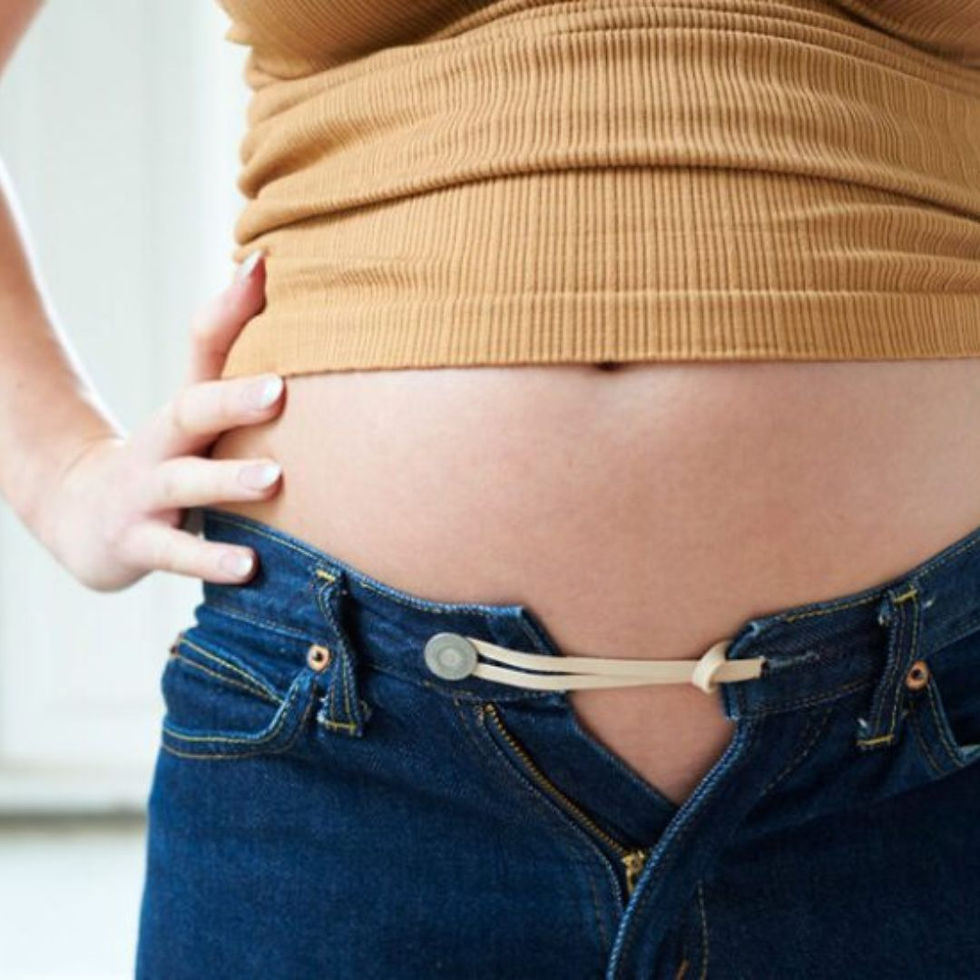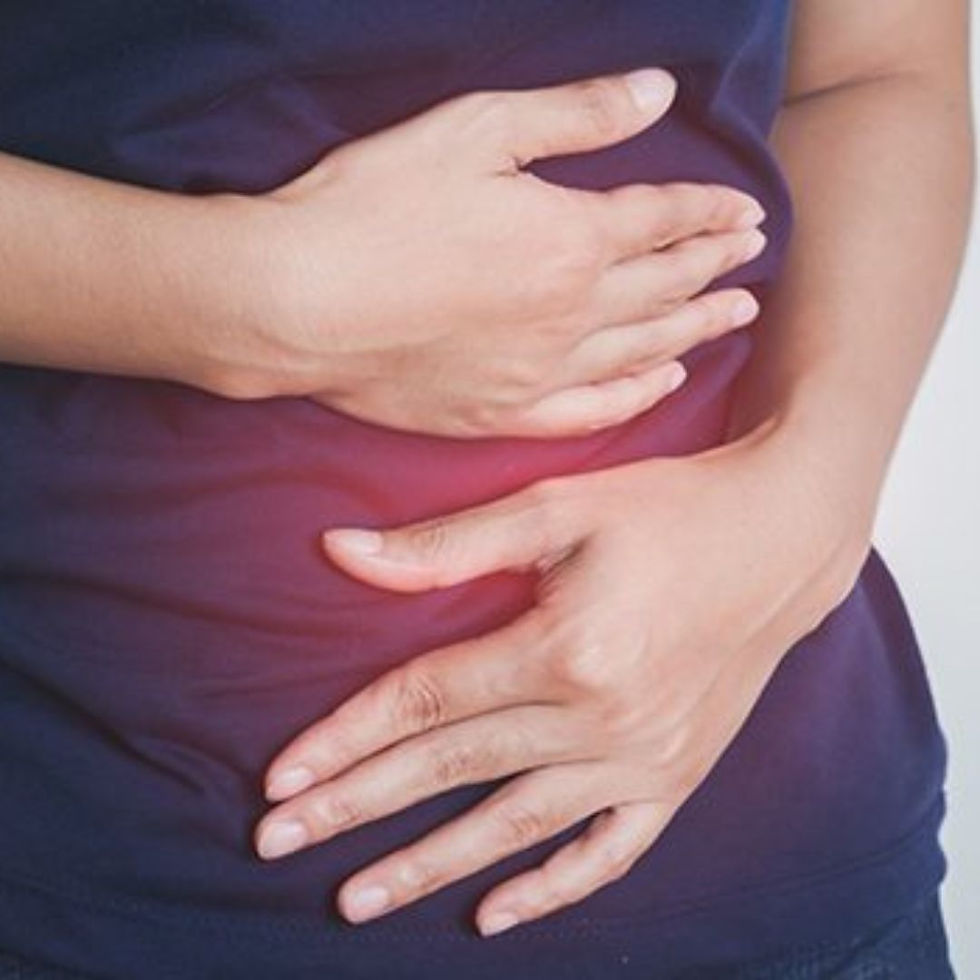Why You Feel Bloated All the Time (And Natural Ways to Beat the Bloat)
- Shannon Wade

- Aug 7, 2025
- 4 min read
Updated: Nov 16, 2025
If your midsection feels like a balloon by 3 p.m. (even when you’ve “eaten clean”), you’re not alone. Bloating is one of the most common—and most frustrating—symptoms I see in perimenopause and menopause. It’s not just food… your hormones, stress, gut health, and digestion are all in the mix.
Let’s break down what’s really going on, how to spot your personal triggers, and what actually helps.
The Real Reasons You’re So Bloated in Midlife

1) Hormone Fluctuations = Fluid + Slower Digestion
Estrogen & progesterone swings in perimenopause can slow motility (how fast food moves through you) and increase water retention.
Lower progesterone = more constipation → more bloat.
Lower estrogen impacts bile flow (needed to digest fats), making meals feel “heavy.”
2) Cortisol + Stress = Tight Belly, Slow Gut
High stress = high cortisol → slower digestion, shallow breathing, and more tension in your core. Translation: gas gets “stuck.”
3) Low Stomach Acid (Yes, Low)
As we age (and with chronic stress), stomach acid can drop—leading to poor protein breakdown, fermentation, gas, and that “food just sits there” feeling.
4) Gut Dysbiosis or SIBO
Imbalances in gut bacteria—or bacteria growing where they shouldn’t—can cause constant bloating, even from healthy foods.
5) Constipation
If you’re not going daily (or you don’t feel fully empty), you’ll feel backed up and bloated. Simple as that.
6) Food Sensitivities (Often New Ones)
Gluten, dairy, alcohol, sugar alcohols, beans/legumes, and high-FODMAP foods can trigger bloating—especially when gut health is already off.
7) Fiber Imbalance
Too little fiber = constipation. Too much (too fast) = gas + distention. The magic is in the right type and amount for you.
Quick Symptom Decoder: What’s Your Likely Driver?
Bloat + burping + fullness after protein → consider low stomach acid
Bloat worsens as the day goes on → think motility/stress/SIBO
Bloating + constipation → progesterone drop, low magnesium, low fiber/water
Bloat after certain foods (on repeat) → sensitivities or dysbiosis
Upper belly bloat (under ribs) → bile flow / fat digestion issues
Natural Ways to Beat the Bloat (Consistently)

1) Support Digestion at the Start Line
Try bitters (a few drops before meals) or lemon water to prime digestion.
Consider apple cider vinegar in water before meals (if tolerated).
Chew thoroughly (yep, it matters).
2) Magnesium for Motility
Magnesium glycinate or citrate before bed can help with relaxation, sleep, and regularity.
3) Move Daily (Especially After Meals)
10-minute walks after meals = magic for motility and blood sugar.
4) Breathe Before You Eat
3–5 slow belly breaths before meals signals “rest and digest,” not “fight or flight.”
5) Hydrate (But Not Chugging With Meals)
Aim for ~½ your body weight in ounces/day. Sip during meals, don’t flood.
6) Try a Gentle Elimination (2–4 Weeks)
Common triggers to test: gluten, dairy, alcohol, sugar alcohols, artificial sweeteners. Reintroduce one at a time.
7) Probiotics or Digestive Enzymes
Can help—but choose based on your symptoms (or get guidance so you don’t guess and waste $$ - I am happpy to help - just ask).
8) Balance Fiber + Bile Flow
Add ground flax or chia slowly (1 tsp → 2 tbsp over time). Yummy in smoothies 🎉
Beetroot, dandelion greens, bitters can support bile flow and fat digestion. Dandelion tea is my go to.
Red Flags: When to Talk to Your Doctor
Don’t ignore:
Unexplained weight loss
Blood in stool
Persistent or severe pain
New or worsening reflux
Bloating with fever or vomiting
Advocating for yourself is powerful. If your doctor dismisses it as “just menopause,” push for deeper answers.
A Simple “De-Bloat Day” You Can Try
Morning: Warm lemon water + light walk
Breakfast: Chia pudding with berries & cinnamon
Mid-morning: Peppermint or ginger tea
Lunch: Wild salmon, arugula, cucumber, avocado, olive oil
Afternoon: 10-minute walk + magnesium-rich snack (pumpkin seeds)
Dinner: Turkey burger (no bun), roasted zucchini & carrots, quinoa (small portion)
Evening: 2 tbsp ground flax in coconut yogurt + herbal tea
Before bed: Magnesium + 5 minutes belly breathing
You’re Not Crazy—and You’re Not Alone
Bloating in midlife isn’t “just aging” or you “not trying hard enough.” Your body is changing, your hormones are shifting, and your gut is asking for support. When you learn how to decode the signals, you can actually fix the root causes—not just mask the discomfort.
Ready to Go a Step Further?
You’ve just learned some great ways to beat the bloat — but if you’re ready to take it a step further, I’ve got something special for you.
The FREE Menopause Bloat Fix Kit gives you everything you need to calm your gut and feel lighter from the inside out. It includes a 7-day de-bloat meal plan, trigger tracker, supplement guide, and simple strategies to reset digestion and reduce inflammation — naturally.
Download your free Bloat Fix Kit and start putting those tips into action with a clear, easy-to-follow plan that actually works with your hormones.
“The Menopause Bloat Fix Kit”
What’s inside:
7-Day De-Bloat Meal Plan (simple, anti-inflammatory, low-bloat swaps)
Bloat Trigger Tracker (food, hormones, stress, sleep, cycle tracking)
Stool & Motility Cheat Sheet (know what “normal” really looks like)
Low vs. High FODMAP Guide (and how to test for sensitivity safely)
Supplement Selector Flowchart (enzymes? probiotics? magnesium? which and when)
5-Minute Belly Breathing Protocol (step-by-step)
Daily De-Bloat Routine (AM/PM checklist)
✨ P.S. If you’re feeling stuck and want a little extra support figuring out what’s really behind your bloating and fatigue, I’d love to chat.You can book a free discovery call— no pressure, just a friendly conversation to help you find your next right step.




Comments